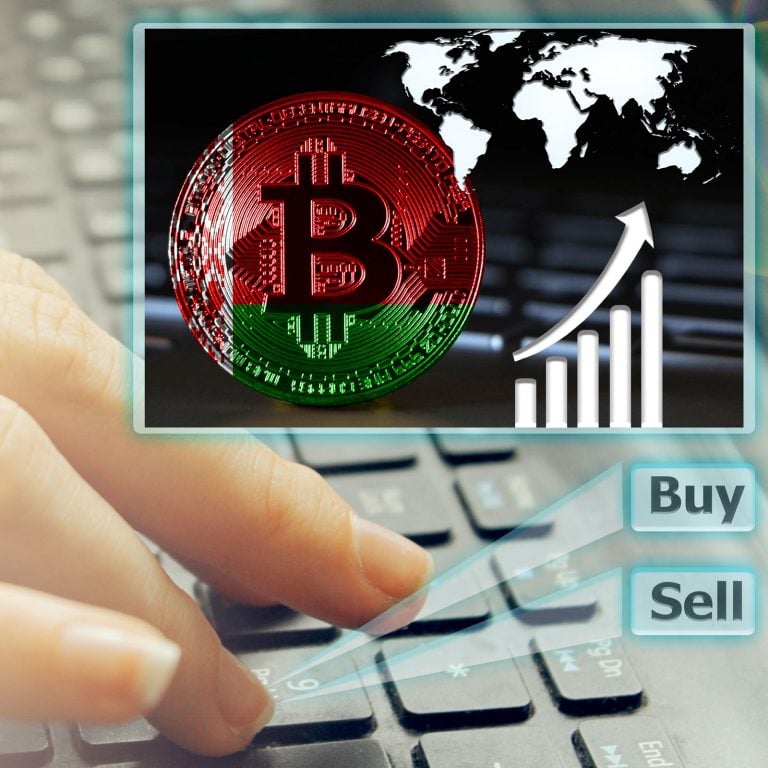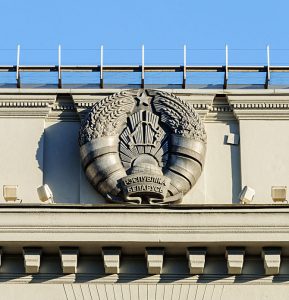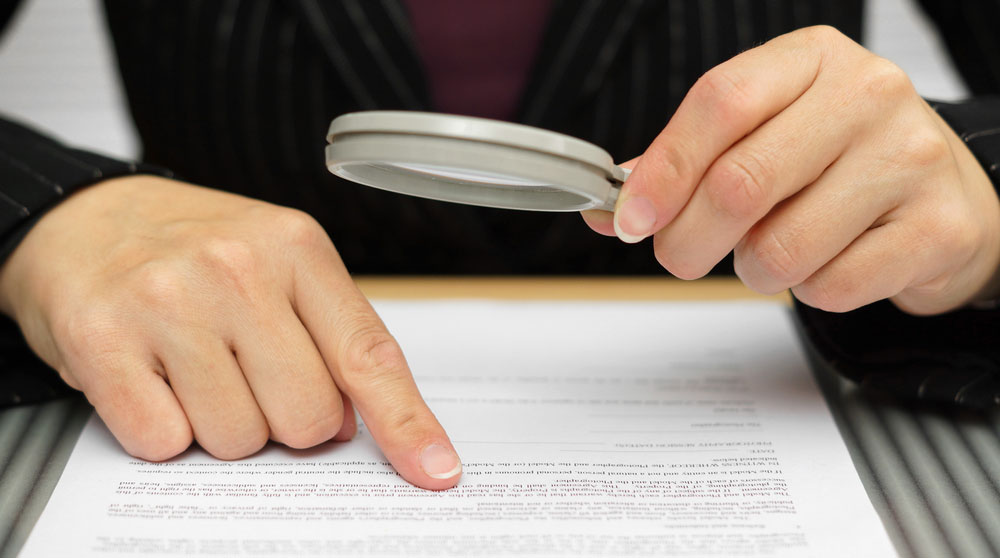Latest news about Bitcoin and all cryptocurrencies. Your daily crypto news habit.

Interest towards cryptocurrencies in Belarus has increased significantly in the past year. Topics related to bitcoin, mining, and blockchain have been popularized by media. Belarusians are searching for more crypto information online, but there are some key questions search engines are unable to answer: Will ordinary citizens benefit from the upcoming legalization? Are they going to be able to receive salaries and pay bills in bitcoin? Concerns are growing that Decree №8 may simply turn Belarus into a “crypto-offshore”.
Also read: New Plant to Assemble Mining Rigs in Belarus
Cryptocurrency Searches Spike in Belarus
Politically and economically isolated from the West, Belarus has been labeled “Europe’s last dictatorship”. However, last year Minsk made a strategic decision to embrace crypto, surprising many of its critics. In December, President Lukashenko signed Decree №8 to legalize cryptocurrencies, initial coin offerings, and smart contracts. It enters into force on March 28 and introduces tax breaks and other incentives for crypto-related activities until 2023, in order to develop the local digital economy.
 Interest towards cryptocurrencies in Belarus spiked last summer, when searches like “what is bitcoin?” and “what is blockchain?” increased substantially, according to the Russian search engine Yandex. By December, cryptocurrency topics climbed up to third place in its Belarusian statistics. Questions like “where can I get bitcoin?” have also contributed to that result. In January, Belarusians were typing “cryptocurrency” into the search bar 45 times more often than a year ago.
Interest towards cryptocurrencies in Belarus spiked last summer, when searches like “what is bitcoin?” and “what is blockchain?” increased substantially, according to the Russian search engine Yandex. By December, cryptocurrency topics climbed up to third place in its Belarusian statistics. Questions like “where can I get bitcoin?” have also contributed to that result. In January, Belarusians were typing “cryptocurrency” into the search bar 45 times more often than a year ago.
Queries regarding opportunities to earn money from crypto-related activities have also increased, Naviny reports. Phrases like “mining farm on credit” and “mining at home” are submitted much more often. Questions about mining hardware have jumped 20-fold since last year. Belarusians are also asking where they can buy “cheap cryptocurrency” and want to know the current rate of bitcoin. ICO-related searches have increased five-fold, with people interested in projects and opportunities.
All questions about crypto earnings have increased significantly in January after the signing of the presidential decree “On the development of the digital economy”. Experts and journalists, however, have been wondering whether Belarussians will be able to “monetize” the hype.
Is There a Catch-22 in Decree №8?
As news.Bitcoin.com reported, the presidential decree entitles companies and individual entrepreneurs to perform operations with tokens and cryptos. To do that, they have to register as residents of the Belarus High Technologies Park (HTP). Private individuals will be allowed to convert cryptos to fiat, using services provided by “crypto-platforms” registered there. However, at this point it seems no one can tell if ordinary Belarusians will be able to spend cryptos in stores or pay for their summer trip in bitcoin. “The issue of regulating cryptocurrency circulation is really relevant. Jurisdictions react differently – some allow it, others ban it, but very few ignore it,” financial analyst Vadim Yosub told Belapan news service, noting that the stance of Belarusian authorities in that respect is not very clear.
Reading Decree №8, one can find a subparagraph numbered 2.2., which states that “natural persons” (private individuals) have the right to possess tokens and, taking into account the specifics established by the Decree, perform the following operations: mining, storage of tokens in virtual wallets, acquisition and exchange for other tokens, and sale of tokens for Belarusian rubles, foreign currency, electronic money. They can also donate and bequeath tokens. Still unclear: will Belarusians be able to receive their salaries in crypto and pay their bills in bitcoin?
Annex 1 provides definitions for terms used in the presidential decree. Its paragraph 4. defines cryptocurrency as “bitcoin, other digital sign (token), used in international circulation as a universal means of exchange”. Paragraph 6. says that purchases and sales of tokens by residents of the Republic of Belarus are to be conducted in Belarusian rubles. Does that mean cryptos will be accepted as legal tender in Belarus after the legalization?
It is also unclear whether foreign companies can register as residents of the Tech Park directly or whether they should establish a local entity. The latter is more likely true, as paragraph 3. in Annex 3 states that “legal entities and individual entrepreneurs of the Republic of Belarus” may register as residents of the High Technology Park. To do so, they should submit the required documentation and carry out, or plan to carry out, one or more of the listed activities.
Banks Advised to Abstain from Crypto Deals
Decree №8 also states that “cryptocurrency operators” must set up local bank accounts to offer exchange services. According to Belarusian media, authorities have prepared a supplementary document describing the principles of interaction between banks and crypto-platforms. Preliminary reports suggest that the “operators” will be classified as “high risk” clients of the banking system. The National Bank has already said that “cryptocurrencies are not reliable assets” and warned commercial banks against cryptocurrency operations.
“Cryptocurrencies are not based on assets, but on electricity spent for their acquisition. Monetary authorities understand that and treat them with caution,” a source familiar with the position of the central bank told Belapan. He added that all necessary measures will be taken to prevent conversion of cryptocurrency in order to cash out proceeds from illicit activities, as that may lead to international sanctions and blacklisting.
 Taking into account the lukewarm attitude of the National Bank towards cryptocurrencies, commercial banks are not too eager to participate in cryptocurrency exchange operations. “Banks are advised to abstain from deals on the crypto market”, a “top-manager” told Belapan, remaining anonymous. Тhe legalization of cryptocurrencies and their circulation may end up being nominal, local media ponders.
Taking into account the lukewarm attitude of the National Bank towards cryptocurrencies, commercial banks are not too eager to participate in cryptocurrency exchange operations. “Banks are advised to abstain from deals on the crypto market”, a “top-manager” told Belapan, remaining anonymous. Тhe legalization of cryptocurrencies and their circulation may end up being nominal, local media ponders.
Belarussians are really curious to know whether they will be able to freely buy and sell cryptocurrencies. “Many are interested in the mechanism of conversion – question number 1 we are being asked”, said Vitaly Koleda, IT specialist who took part in a panel discussion at the XIX Assembly of Business Circles of Belarus last week. Lawyers participating in the event also confirmed they were receiving many similar queries after the signing of the “digital economy” decree.
“The decree does not define and does not give legal status to cryptocurrencies,” says Oxana Sachkovskaya, Deputy Head of the Department of Digital Technologies at the Head Office of the Payment System. She points out that it is not clear who will be responsible for regulating their circulation in the country. Opinions have been expressed that the implementation of Decree №8 without additional regulations for the whole crypto sector, may turn Belarus into a “crypto-offshore” zone. “Тhere are concerns that this may lead to sanctions usually imposed on offshore companies,” financial analyst Vadim Yosub said, quoted by Navyni.
With more questions than answers, ordinary Belarusians may soon ask Yandex “What does legalization really mean?”
Do you expect Belarusian authorities to expand the legalization of the crypto sector to allow using cryptocurrencies as means of payment? Tell us in the comments section below.
Images courtesy of Shutterstock.
Express yourself freely at Bitcoin.com’s user forums. We don’t censor on political grounds. Check forum.Bitcoin.com.
The post More Belarusians Search “Crypto”, Question “Legalization” appeared first on Bitcoin News.
Disclaimer
The views and opinions expressed in this article are solely those of the authors and do not reflect the views of Bitcoin Insider. Every investment and trading move involves risk - this is especially true for cryptocurrencies given their volatility. We strongly advise our readers to conduct their own research when making a decision.
